Question: (5%) Problem 6: If a car takes a banked curve at less than a given speed, friction is needed to keep it from sliding toward
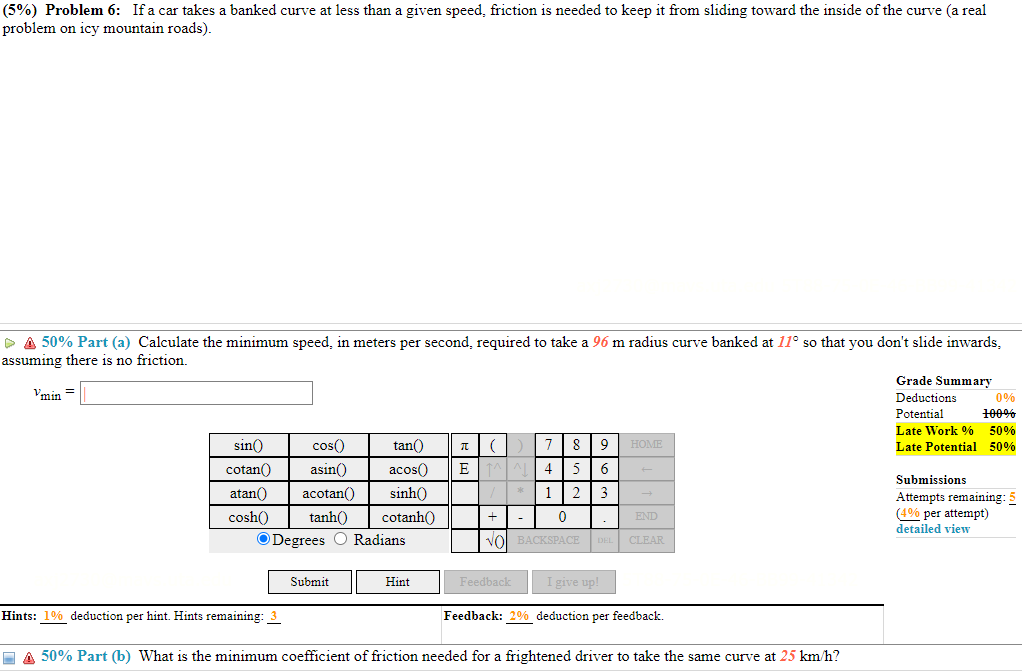
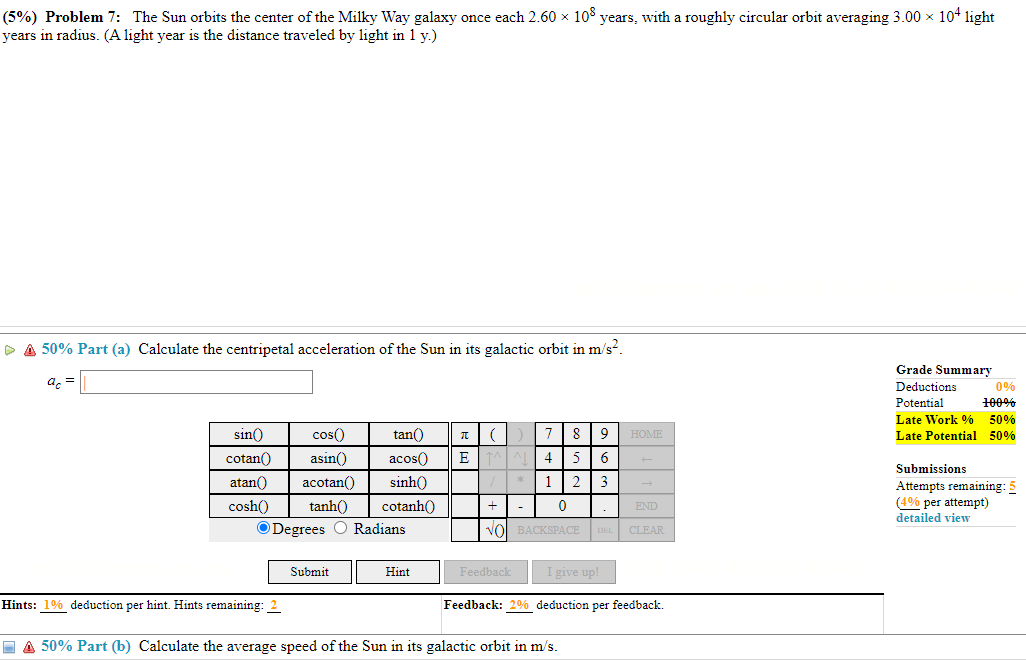
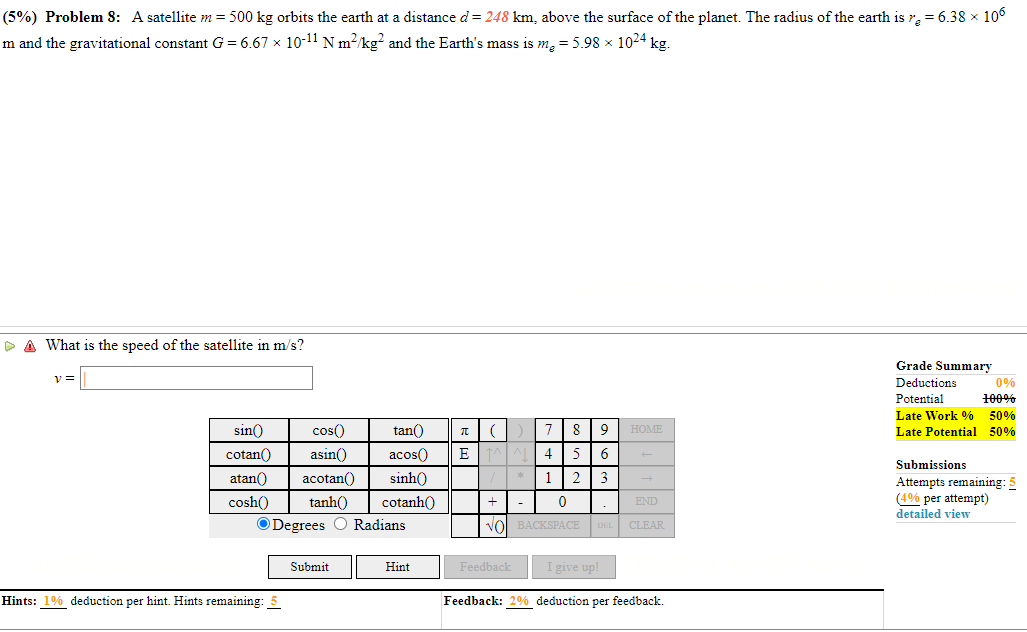
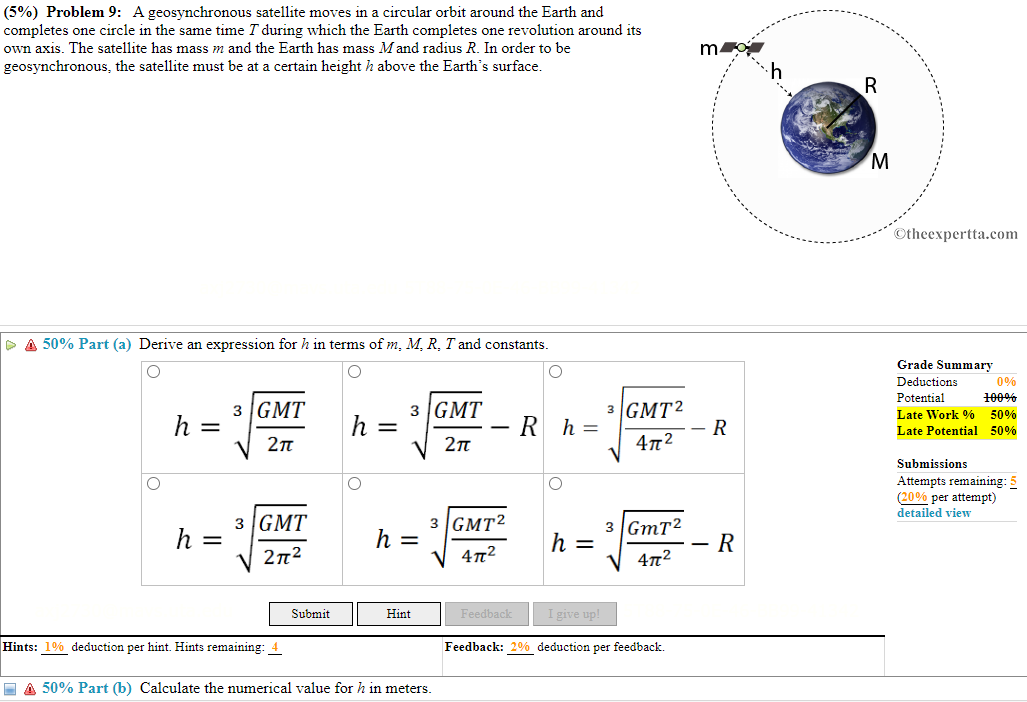
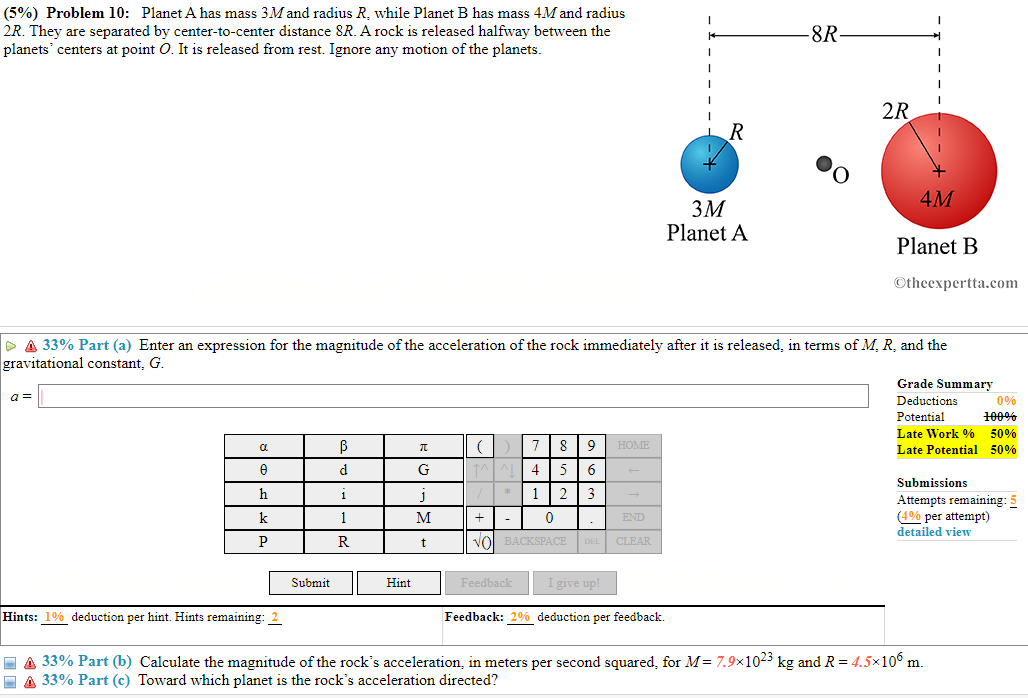
(5%) Problem 6: If a car takes a banked curve at less than a given speed, friction is needed to keep it from sliding toward the inside of the curve (a real problem on icy mountain roads). 50% Part (a) Calculate the minimum speed, in meters per second, required to take a 96 m radius curve banked at 1/" so that you don't slide inwards, assuming there is no friction. Grade Summary Vmin Deductions Potential 100% Late Work % 50% sin() cos() tan( 7 8 9 HOME Late Potential 50% cotan( asin( acost E 4 5 6 Submissions atan() acotan() sinh( 3 Attempts remaining: 5 cosh( tanh() cotanh( + END (4% per attempt) detailed view O Degrees O Radians VO BACKSPACE DEL CLEAR Submit Hint Feedback I give up! Hints: 1% deduction per hint. Hints remaining: 3 Feedback: 2% deduction per feedback 4 50% Part (b) What is the minimum coefficient of friction needed for a frightened driver to take the same curve at 25 km/h?(5%) Problem 7: The Sun orbits the center of the Milky Way galaxy once each 2.60 x 10 years, with a roughly circular orbit averaging 3.00 x 10* light years in radius. (A light year is the distance traveled by light in 1 y.) A 50% Part (a) Calculate the centripetal acceleration of the Sun in its galactic orbit in m/s-. Grade Summary a- = Deductions 0% Potential 100% Late Work % 50% sin() cos() tan( 7 8 9 HOME Late Potential 50% cotan( asin acos() F 4 6 Submissions atan() acotan sinh( 2 3 Attempts remaining: 5 cosh() tanh() cotanh( + END (4% per attempt) detailed view O Degrees O Radians NO BACKSPACE DEL CLEAR Submit Hint Feedback I give up! Hints: 1% deduction per hint. Hints remaining: 2 Feedback: 2% deduction per feedback. 4 50% Part (b) Calculate the average speed of the Sun in its galactic orbit in m's.(5%) Problem S: A satellite m = 500 kg orbits the earth at a distance d = 248 km, above the surface of the planet. The radius of the earth is r. = 6.38 x 10 m and the gravitational constant G = 6.67 x 10-ll N m /kg- and the Earth's mass is me = 5.98 x 102#kg. CA What is the speed of the satellite in m/s? Grade Summary V= Deductions 1% Potential 100% Late Work % 50% sin() cos() tan( 7 9 HOME Late Potential 50% cotan() asin( acos() 4 Submissions atan() acotan( ) sinh 2 13 Attempts remaining: 5 cosh() tanh() cotanh() + END (4% per attempt) detailed view O Degrees O Radians NO BACKSPACE DEL CLEAR Submit Hint Feedback I give up! Hints: 1% deduction per hint. Hints remaining: 5 Feedback: 2% deduction per feedback.(5%) Problem 9: A geosynchronous satellite moves in a circular orbit around the Earth and completes one circle in the same time / during which the Earth completes one revolution around its own axis. The satellite has mass m and the Earth has mass Mand radius R. In order to be geosynchronous, the satellite must be at a certain height / above the Earth's surface. R M Otheexpertta.com A 50% Part (a) Derive an expression for h in terms of m. M. R. I and constants. O O Grade Summary Deductions 0% Potential 100% 3 GMT 3 GMT 3 GMT2 h = h = R h = Late Work % 50% R Late Potential 50% 2TT 417 2 Submissions O O O Attempts remaining: 5 (20% per attempt) GMT detailed view 3 3 GMT2 h = h = 3 GMT2 h = R 2 17 2 Submit Hint Feedback I give up! Hints: 19% deduction per hint. Hints remaining: 4 Feedback: 2% deduction per feedback. 4 50% Part (b) Calculate the numerical value for h in meters.(5%) Problem 10: Planet A has mass 3M/ and radius R. while Planet B has mass 4M/ and radius 2R. They are separated by center-to-center distance 8R. A rock is released halfway between the 8R planets' centers at point O. It is released from rest. Ignore any motion of the planets. 2R R Oo 3M 4M Planet A Planet B Otheexpertta.com A 33% Part (a) Enter an expression for the magnitude of the acceleration of the rock immediately after it is released, in terms of M. R, and the gravitational constant, G. Grade Summary a = Deductions 1% Potential 100% Late Work % 50% 7 9 HOME Late Potential 50% 4 6 Submissions 1 2 3 Attempts remaining: 5 + END (4% per attempt detailed view VO BACKSPACE DEL CLEAR Feedback I give up! Hints: 1% deduction per hint. Hints remaining: 2 Feedback: 2% deduction per feedback. 4 33% Part (b) Calculate the magnitude of the rock's acceleration, in meters per second squared, for M= 7.9x1025 kg and R = 4.5x10 m. 4 33% Part (c) Toward which planet is the rock's acceleration directed
Step by Step Solution
There are 3 Steps involved in it

Get step-by-step solutions from verified subject matter experts


